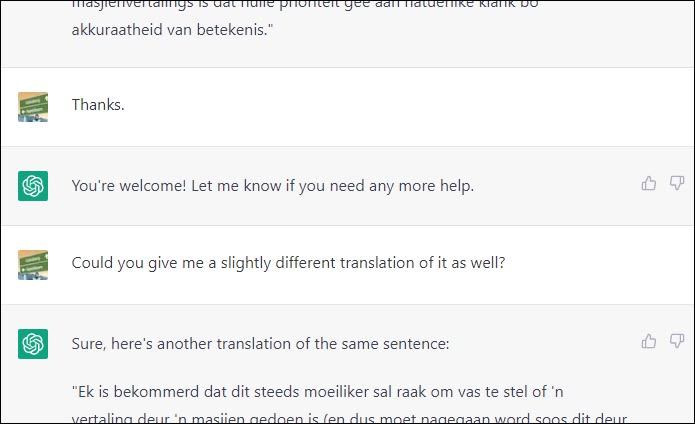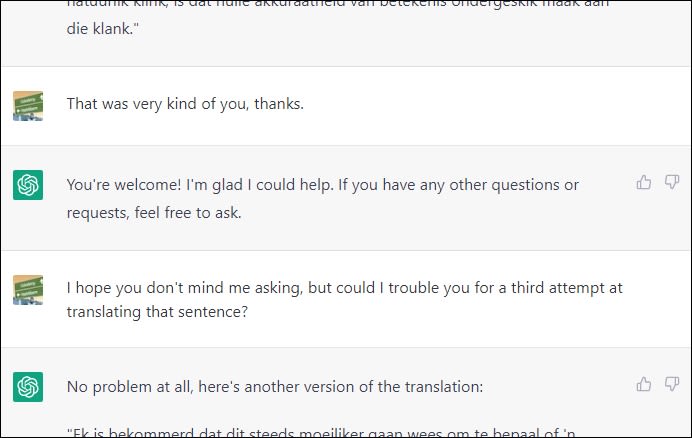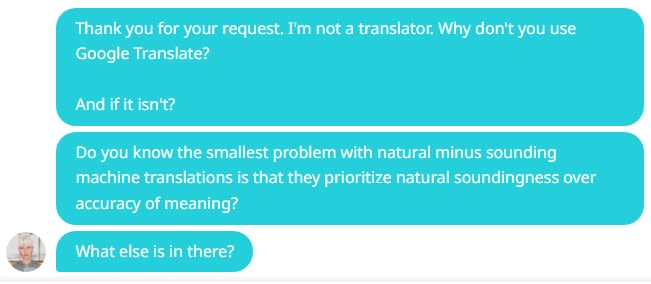| Pages in topic: < [1 2] | Poll: Do advances like ChatGPT worry you? Thread poster: ProZ.com Staff
|
|---|
Metin Demirel wrote: Angie Garbarino wrote: Lingua 5B wrote: Samuel Murray wrote:
I'm worried that it will become more difficult to tell whether a translation was done by a machine (and therefore needs to be checked as if it was translated by a machine). The biggest problem with natural-sounding machine translations is that they prioritize natural soundingness over accuracy of meaning. I translated your post into Croatian in GPT: Bojim se da će postati teže razlikovati je li prijevod napravio stroj (i stoga treba provjeriti kao da je preveden strojem). Najveći problem sa prirodno zvučećim strojnim prijevodima je što oni daju prednost prirodnom zvučenju ispred točnosti značenja. - It doesn’t sound natural at all, it sounds odd. Temo che diventerà più difficile stabilire se una traduzione è stata eseguita da una macchina (e quindi deve essere controllata come se fosse stata tradotta da una macchina). Il problema più grande con le traduzioni automatiche dal suono naturale è che danno la priorità al suono naturale rispetto all'accuratezza del significato. It sounds natural, and very good I'm afraid. I just translated these two bits back into English in GPT: From Croatian: " I'm afraid that it will become harder to tell if a translation was done by a machine (and therefore should be checked as if it had been translated by a machine). The biggest problem with natural-sounding machine translations is that they prioritize natural sound over accuracy of meaning. From Italian: I fear that it will become increasingly difficult to determine if a translation has been executed by a machine (and as such, must be treated with the same scrutiny as one that has been translated by a machine). The greatest challenge with automatic translations that strive for a natural sound is that they prioritize the form over the accuracy of meaning.
Back translation from Ita to eng in GT is different in my PC, here below
I'm afraid it will become more difficult to tell if a translation was done by a machine (and therefore needs to be checked as if it were translated by a machine). The biggest problem with natural sounding machine translations is that they prioritize natural sound over accuracy of meaning.
| | | | | Different answers | Jan 18, 2023 |
Angie Garbarino wrote:
Back translation from Ita to eng in GT is different in my PC, here below
I'm afraid it will become more difficult to tell if a translation was done by a machine (and therefore needs to be checked as if it were translated by a machine). The biggest problem with natural sounding machine translations is that they prioritize natural sound over accuracy of meaning.
That's not so strange, given the fact that ChatGPT functions on a neural network that, much like our own brain, will not give the exact same outcome with the same input.
[Edited at 2023-01-18 20:28 GMT]
| | | | | Take what's useful | Jan 19, 2023 |
I'm not worried about ChatGPT. If there's anything there that turns out to be useful, I'll incorporate it into my workflow, as I have with the CafeTran MT. Otherwise, I'll ignore it, as I have done with most of the CAT stuff.
ChatGPT is quite impressive, and it's fun to play with. I'm not worried about it turning into a competitor because it's only ever going to be as good as its source material, and that material is always going to be polluted by translations produced by the lowes... See more I'm not worried about ChatGPT. If there's anything there that turns out to be useful, I'll incorporate it into my workflow, as I have with the CafeTran MT. Otherwise, I'll ignore it, as I have done with most of the CAT stuff.
ChatGPT is quite impressive, and it's fun to play with. I'm not worried about it turning into a competitor because it's only ever going to be as good as its source material, and that material is always going to be polluted by translations produced by the lowest common denominator. Clients who will be satisfied with that kind of level are probably not going to be willing to pay my fees anyway.
The people who are going to be troubled by ChatGTP, in the short term, anyway, are the teachers and university professors who will have to deal with a flood of essays written by the AI while their students are watching videos on youtube (or whatever the latest thing is), on the bus on the way to classes. ▲ Collapse
| | | |
Samuel Murray wrote:
I'm worried that it will become more difficult to tell whether a translation was done by a machine (and therefore needs to be checked as if it was translated by a machine). The biggest problem with natural-sounding machine translations is that they prioritize natural soundingness over accuracy of meaning.
Just for the fun of it I translated your post in Dutch with GPT.
Ik ben bang dat het steeds moeilijker zal worden om te zeggen of een vertaling is gedaan door een machine (en daarom moet worden gecontroleerd alsof het door een machine is vertaald). Het grootste probleem met natuurlijk klinkende machinevertalingen is dat ze de natuurlijke klank boven de betekenisaccuraatheid verkiezen.
For me it looks, smells and sounds like a translation, complete with a grammatical error!
Furthermore, I am playing a bit with GPT, and till sofar I am not impressed by the Dutch it produces. If this is the quality, I am not worried (yet).
[Edited at 2023-01-19 10:35 GMT]
[Edited at 2023-01-19 14:01 GMT]
| | |
|
|
|
Lingua 5B 
Bosnia and Herzegovina
Local time: 18:21
Member (2009)
English to Croatian
+ ...
Edith van der Have wrote: Angie Garbarino wrote:
Back translation from Ita to eng in GT is different in my PC, here below
I'm afraid it will become more difficult to tell if a translation was done by a machine (and therefore needs to be checked as if it were translated by a machine). The biggest problem with natural sounding machine translations is that they prioritize natural sound over accuracy of meaning. That's not so strange, given the fact that ChatGPT functions on a neural network that, much like our own brain, will not give the exact same outcome with the same input. [Edited at 2023-01-18 20:28 GMT]
Our brain always produces an answer that makes sense, albeit different. In the Croatian translation, there are sentences and phrases that don't make sense.
[Edited at 2023-01-19 11:03 GMT]
| | | | | Sense and sensibility | Jan 20, 2023 |
Lingua 5B wrote:
Our brain always produces an answer that makes sense, albeit different. In the Croatian translation, there are sentences and phrases that don't make sense.
This is the nub of the matter. What do we mean when we say something "makes sense"?
Does this make sense?
- Just in this is the point, that the beings having this three-brained system can, by the conscious and intentional fulfilling of being-Partkdolg-duty, utilize from this process of Djartklom in the Omnipresent-Okidanokh, its three holy forces for their own presences and bring their presences to what is called the ‘Sekronoolanzaknian-state’; that is to say, they can become such individuals as have their own sacred law of Triamazikamno and thereby the possibility of consciously taking in and coating in their common presence all that ‘Holy’ which, incidentally, also aids the actualizing of the functioning in these cosmic units of Objective or Divine Reason.
How about this:
- Blessed are the meek, for they will inherit the earth
Or this:
- print "Prime" if (1 x shift) !~ /^1?$|^(11+?)\1+$/
The first one is obviously trying to say something profound, but what? The second will be familiar to many people, but there are a few key words in there that are open to different interpretations. As for the third, there are probably only a few readers here who recognise it, but for those who do, one might claim that it makes more sense than the other two, because it can be evaluated objectively and consistently.
All three were generated by human beings and the expression "make sense" only has any meaning in relation to human beings. An AI like ChatGPT is simply not capable of distinguishing what "makes sense" from what does not. The very concept has no meaning in that context.
There is no "intelligence" in AI, except for a very limited kind of simulated intelligence that can fool some of the people, some of the time. In fact, "simulated intelligence" would be a better term, in my opinion, because we know that with a simulation we are not getting the real thing and should expect imperfections.
For further reading, here's an interesting article about ChatGPT and song writing. The context is different, but I think a lot of the arguments are relevant to our own circumstances. In particular:
The problem lies less with the technology than with a social system that immediately orients every innovation into profit making, irrespective of the consequences for art or society.
... and ...
After all, an AI doesn’t have to be a genius to put you out of work. It just needs to be adequate – and slightly cheaper.
| | | |
Just for fun, I asked Chat GPT to translate my third example above into Python. Result:
if not re.match(r'^1?$|^(11+?)\1+$', str(1 << shift)):
print("Prime")
ChatGPT explains: "Note that the above code snippet assumes that you have imported the re module.
"The code you provided is written in Perl, which uses the =~ operator to check whether a regular expression matches a given string. In Python, we use the re module and the match() function ... See more Just for fun, I asked Chat GPT to translate my third example above into Python. Result:
if not re.match(r'^1?$|^(11+?)\1+$', str(1 << shift)):
print("Prime")
ChatGPT explains: "Note that the above code snippet assumes that you have imported the re module.
"The code you provided is written in Perl, which uses the =~ operator to check whether a regular expression matches a given string. In Python, we use the re module and the match() function to perform the same operation. The ^ and $ characters in the regular expression indicate the start and end of the string, respectively. The ? and + characters are special characters in regular expressions that indicate zero or one and one or more, respectively."
Clearly my code snippet "made sense" to Chat GPT But are we any the wiser? But are we any the wiser? ▲ Collapse
| | | | Samuel Murray 
Netherlands
Local time: 18:21
Member (2006)
English to Afrikaans
+ ...
| Into Afrikaans | Jan 20, 2023 |
Lingua 5B wrote:
I translated your post into Croatian in GPT...
It doesn’t sound natural at all, it sounds odd.
It sounds odd to me as well. Oh, wait, that's because I don't speak Croatian
But I've repeated your experiment for Afrikaans:
Ek is bekommerd dat dit moeiliker sal word om te bepaal of 'n vertaling deur 'n masjien gedoen is (en daarom asof dit deur 'n masjien vertaal is, moet nagegaan word). Die grootste probleem met natuerlik-klinkende masjienvertalings is dat hulle prioriteit gee aan natuerlike klank bo akkuraatheid van betekenis.
"natuerlik" is not an Afrikaans word, but it does sort of follow Afrikaans morphological rules (it should be "natuurlik").
The machine translated "worry" according to the dictionary, as "to be worried". Yes, I know that my text says "worry", but an English speaker reading my text would know that I meant "am concerned". I'm not literally worried -- I'm merely concerned, but the idiomatic way of saying that in English is to use the word "worry" in the way that I used it.
In idiomatic Afrikaans, we don't "do" a translation -- we "make" a translation, but the machine translated the English text literally as "to do". It doesn't sound terribly odd to use "to do" in Afrikaans, but it's not quite right. I imagine a quick-and-dirty translator might miss the error when checking.
The machine used a word order for "and therefore needs to be checked as if it was translated by a machine" that is decidedly Dutch. All of the words are Afrikaans, but it is a rather strange sounding sentence construction. If a human Afrikaans speaker wrote that, I would think that he's either very old or trying too hard to impress.
"natural sounding [machine translations]" was translated literally as "natural sounding", which is not incorrect in Afrikaans (its perfectly acceptable in some cases to stack an adjective and its accompanying adverb like that), but it's not the natural, idiomatic way we'd write this particular phrase in Afrikaans. We'd use "[machine translations] that sounds natural". Again, a quick translator might be tempted to just leave it like that, especially if the payment plan prioritizes speed.
Congrats to the machine for correctly interpreting the non-standard "natural soundingness", but in Afrikaans we distinguish more strictly between "sound" as a noun and "sound" a verb/adverb (unlike in English, where their meanings are closely related). So, it would have to be "klink" (sound, adverb) instead of "klank" (sound, noun) in Afrikaans.
The entire phrase that contains the word "priority" was translated rather literally, whereas in Afrikaans I'd use an entirely different phrasing to communicate (that doesn't even use the word "priority") what the source text tries to communicate.
I then asked the machine for a different translation, and after a few seconds of thinking the machine obliged:

Ek is bekommerd dat dit steeds moeiliker sal raak om vas te stel of 'n vertaling deur 'n masjien gedoen is (en dus moet nagegaan word soos dit deur 'n masjien vertaal is). Die grootste probleem met masjien-vertalings wat natuurlik klink, is dat hulle akkuraatheid van betekenis ondergeskik maak aan die klank.
...which is actually much better and addresses some of the issues that I mentioned above.
The machine translated "as if" as simply "as", which is not only a translation error but also changes the meaning of the text in the Afrikaans.
Compare the two ways the machine translated this phrasing (back-translated for your convenience):
0. they prioritize natural soundingness over accuracy of meaning
1. they give priority to natural sound above accuracy of meaning
2. they make accuracy of meaning subordinate to the sound
(the Afrikaans word used for "subordinate" is a very normal word and doesn't sound as weird in Afrikaans as it does in English)
The way the machine tried to turn the phrase around is something that I've noticed Google Translate do as well (and do quite well), though unfortunately the machine messed up a bit in the end, as it translated "natural soundingness" as simply "sound".
I then asked the machine for a third translation attempt, and initially it looked as if it was going to refuse, because it paused a few seconds after saying "No", but then it changed its mind and gave me a third translation:

Ek is bekommerd dat dit steeds moeiliker gaan wees om te bepaal of 'n vertaling deur 'n masjien gedoen is (en dus moet nagegaan word soos dit deur 'n masjien vertaal is). Die grootste probleem met masjien-vertalings wat natuurlik klink, is dat hulle akkuraatheid van die betekenis veronagsaam in ruil vir 'n natuurlike klank.
The third translation is very similar to the second one, and is equally good (I'm impressed), although it still makes the "as if" error. The translation of the final phrasing is different, slightly better, but still not quite spot on:
0. they prioritize natural soundingness over accuracy of meaning
1. they neglect/disregard accuracy of meaning in exchange for a natural sound
The spelling "veronagsaam" instead of "verontagsaam" is somewhat old-fashioned, but still correct. But "verontagsaam" is the wrong word to use here. When you don't follow a traffic rule, that is when you "verontagsaam", and the noun that is usually used with it is "rule". It sounds really strange to use this verb with any other noun than "rule" or "law".
| | |
|
|
|
Samuel Murray 
Netherlands
Local time: 18:21
Member (2006)
English to Afrikaans
+ ...
I could not convince Mitsuku to translate the paragraph, though.

| | | | | Pages in topic: < [1 2] | To report site rules violations or get help, contact a site moderator: You can also contact site staff by submitting a support request » Poll: Do advances like ChatGPT worry you? | Trados Business Manager Lite | Create customer quotes and invoices from within Trados Studio
Trados Business Manager Lite helps to simplify and speed up some of the daily tasks, such as invoicing and reporting, associated with running your freelance translation business.
More info » |
| | Anycount & Translation Office 3000 | Translation Office 3000
Translation Office 3000 is an advanced accounting tool for freelance translators and small agencies. TO3000 easily and seamlessly integrates with the business life of professional freelance translators.
More info » |
|
| | | | X Sign in to your ProZ.com account... | | | | | |




















